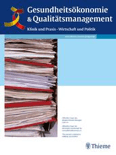
Gesundheitsoekonomie und Qualitaetsmanagement
Scope & Guideline
Navigating the Complexities of Healthcare Economics
Introduction
Aims and Scopes
- Health Economics:
The journal emphasizes the economic evaluation of healthcare interventions, including cost-effectiveness analyses and budget impact assessments, to inform policy decisions and resource allocation. - Quality Management:
Research on quality management practices in healthcare settings is a core focus, including studies on patient safety, quality assurance, and initiatives aimed at improving the overall patient care experience. - Digital Health Innovations:
The journal highlights the role of digital technologies in healthcare, such as electronic health records, telemedicine, and artificial intelligence, exploring their impact on patient outcomes and system efficiency. - Patient-Centered Care:
Emphasis is placed on patient perspectives, including patient satisfaction, shared decision-making, and the effectiveness of interventions from the patient's viewpoint. - Healthcare Policy and Reform:
The journal addresses healthcare policy issues, including reforms in hospital management, financing systems, and the implications of regulatory changes on service delivery. - Interdisciplinary Approaches:
Research that integrates multiple disciplines within healthcare, such as nursing, medicine, and health informatics, is encouraged to foster comprehensive solutions to complex health issues.
Trending and Emerging
- Digital Transformation in Healthcare:
The integration of digital technologies into healthcare practices is a major trend, with increasing research on the effectiveness of telemedicine, electronic health records, and health apps. - Artificial Intelligence in Health Management:
The application of AI for predictive analytics, personalized medicine, and operational efficiency is gaining traction, highlighting the need for research on its economic implications and integration into clinical workflows. - Patient Engagement and Empowerment:
There is a growing focus on research that explores how to engage patients in their care processes, including shared decision-making and the impact of patient education on health outcomes. - Sustainability in Healthcare:
Emerging studies are addressing the environmental impacts of healthcare practices, including sustainability initiatives within hospitals and the economic implications of eco-friendly practices. - Healthcare Workforce Management:
Research on optimizing workforce deployment, addressing staff shortages, and improving job satisfaction among healthcare workers is becoming increasingly relevant, especially post-pandemic. - Value-Based Care Models:
The trend towards value-based care is reflected in research focused on measuring outcomes relative to costs, emphasizing the importance of quality and patient satisfaction in reimbursement models.
Declining or Waning
- Traditional Medical Models:
There is a noticeable decline in papers focusing on traditional, non-integrated approaches to healthcare delivery, as the emphasis shifts towards more interdisciplinary and patient-centered models. - In-person Healthcare Delivery Models:
With the rise of digital health solutions, research on conventional in-person healthcare delivery models is becoming less frequent, reflecting a broader trend towards telehealth and remote care. - Static Quality Metrics:
Research centered on static or conventional quality metrics is waning as the field moves towards dynamic, patient-reported outcomes and real-time data analytics. - Siloed Research Approaches:
The journal increasingly discourages siloed research that does not integrate perspectives from multiple stakeholders, such as patients, providers, and policymakers, in favor of more collaborative studies. - Cost-Only Focused Studies:
Studies that focus solely on cost without considering quality outcomes or patient satisfaction are becoming less prevalent, as the field moves towards a more holistic understanding of value in healthcare.
Similar Journals

ClinicoEconomics and Outcomes Research
Bridging Economics and Healthcare for Impactful SolutionsClinicoEconomics and Outcomes Research is a prestigious open-access journal published by DOVE MEDICAL PRESS LTD, located in New Zealand. Since its inception in 2009, it has established itself as a vital resource for researchers and practitioners in the fields of economics, health policy, and outcomes research. With a commendable impact reflected in its rankings—Q1 in Economics, Econometrics and Finance and Q2 in Health Policy—the journal effectively bridges the gap between economic evaluation and healthcare delivery. This publication is particularly significant for those focused on the economic implications of health interventions, policy analysis, and decision-making processes in healthcare systems. As an open-access journal, ClinicoEconomics and Outcomes Research ensures that its valuable content is widely accessible, enhancing knowledge dissemination and fostering collaboration among academia, industry, and policymakers. With an ambition to contribute to the improvement of health outcomes through rigorous research, it invites submissions that address the multifaceted challenges facing the economics of healthcare today. Join the scholarly dialogue where innovative ideas in health economics thrive!

Applied Health Economics and Health Policy
Empowering decision-makers with applied health economics.Applied Health Economics and Health Policy, published by Springer International Publishing AG, stands as a premier academic journal dedicated to the intersection of economic theory and health policy. With a strong focus on the practical application of economic principles to health issues, this journal addresses crucial topics such as healthcare financing, resource allocation, and economic evaluation of health interventions. Its impressive rankings—in the top quartile for both Health Policy and Medicine, as well as a notable second quartile in Economics—illustrate its significant impact within the fields of health economics and policy research. The journal is aimed at researchers, policymakers, and students who seek to explore innovative solutions to contemporary health challenges. Established in 2002 with ongoing publications through 2024, the journal features open access options that enhance accessibility and engagement with its extensive body of research articles, ensuring that vital insights are available to a global audience.

Farmeconomia-Health Economics and Therapeutic Pathways
Driving the future of health economics with open access knowledge.Farmeconomia-Health Economics and Therapeutic Pathways is a pioneering journal within the field of health economics, dedicated to exploring the intersections of health policy, therapeutics, and economic evaluations. Published by SEED MEDICAL PUBLISHERS, this Open Access journal has been at the forefront of advancing knowledge since 2012, ensuring that vital research is readily accessible to a global audience without subscription barriers. The journal aims to facilitate the dissemination of insightful studies, systematic reviews, and theoretical discussions that determine the cost-effectiveness of therapeutic options, ultimately guiding evidence-based healthcare decisions. Based in *Torino, Italy*, this journal is committed to serving researchers, healthcare professionals, and students who are eager to contribute to and stay updated on the latest developments in health economics and policy implementation. With its broad-ranging scope and dedication to quality research, Farmeconomia stands as an essential resource for anyone engaged in the complex dynamics of health systems and their economic implications.
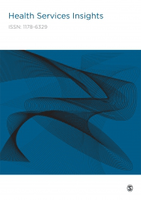
Health Services Insights
Connecting researchers to shape global health policy.Health Services Insights is a prestigious, open-access journal published by SAGE Publications Inc. Based in the United Kingdom, this journal has become a vital resource for researchers and professionals in the fields of Health Policy and Public Health. Since its inception in 2008, Health Services Insights has consistently aimed to disseminate high-quality, peer-reviewed research that informs practice and policy in health service delivery and management. With an impressive Q1 ranking in both its categories as of 2023, and a respectable Scopus ranking positioning it within the upper percentiles of its fields, the journal continues to attract influential contributions from global experts. Its open-access format, established in 2013, ensures that vital insights on health services are accessible to all, facilitating knowledge sharing and collaboration among researchers, practitioners, and students alike. By focusing on impactful research and innovation, Health Services Insights plays a crucial role in addressing contemporary challenges in health services and improving health outcomes worldwide.
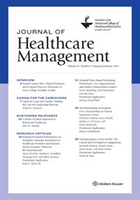
JOURNAL OF HEALTHCARE MANAGEMENT
Connecting Research to Real-World Healthcare Solutions.Journal of Healthcare Management, published by Lippincott Williams & Wilkins, is a distinguished peer-reviewed journal that serves as a vital platform for the dissemination of research in the fields of healthcare policy, leadership, and management. With a focus spanning from 1998 to 2024, this journal holds significant relevance in the evolving landscape of healthcare, evidenced by its categorization in Q2 in Leadership and Management and Q3 in Health Policy, as per the 2023 category quartiles. It also ranks in the top tiers of medicine and strategy management, providing a well-rounded resource for professionals navigating complex health systems. The journal embraces an eclectic mix of empirical studies, theoretical frameworks, and case analyses, appealing to researchers, practitioners, and students alike. With its Open Access options, the journal fosters wider accessibility and engagement with its content, ensuring that critical insights into healthcare management are available to a global audience located in the United States and beyond. The ISSN for the journal is 1096-9012 and the E-ISSN is 1944-7396. For more information, please contact the publisher at their address: TWO COMMERCE SQ, 2001 MARKET ST, PHILADELPHIA, PA 19103.
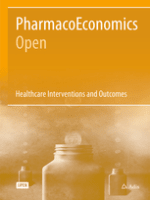
Pharmacoeconomics-Open
Transforming Healthcare Through Collaborative ScholarshipPharmacoeconomics-Open, an esteemed journal published by SPRINGER INT PUBL AG, is a vital resource for scholars and practitioners in the fields of health policy and pharmacology. Since its transition to an Open Access platform in 2017, the journal has aimed to democratize access to valuable research, fostering innovation and collaboration globally. With notable rankings in the 2023 Scopus indices—including Q2 in Health Policy and both categories of Pharmacology—Pharmacoeconomics-Open engages with pressing issues in health economics, providing insights into cost-effectiveness analyses and healthcare decision-making. The journal’s commitment to high-quality, peer-reviewed articles ensures that it remains a significant player in advancing knowledge and understanding within its disciplines, serving as an essential forum for researchers, policymakers, and students alike.
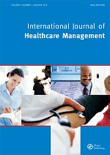
International Journal of Healthcare Management
Bridging theory and practice in health policy and leadership.The International Journal of Healthcare Management, published by ROUTLEDGE JOURNALS, TAYLOR & FRANCIS LTD, stands as a crucial platform for the dissemination of innovative research and insights in the realm of healthcare management. With a focus on health policy, leadership, and management, this journal aims to bridge the gap between theory and practice, providing a valuable resource for researchers, professionals, and students alike. It boasts an impressive Q2 ranking in Leadership and Management and a Q3 ranking in Health Policy for 2023, highlighting its influence and relevance within the academic community. With an accessible ISSN of 2047-9700 and E-ISSN of 2047-9719, the journal features an array of peer-reviewed articles that promote the advancement of knowledge and best practices in healthcare settings. While currently not offered as open access, the journal publishes high-quality research that underscores the importance of effective management strategies in enhancing healthcare outcomes. Positioned in the United Kingdom, the journal continues to contribute significant knowledge and frameworks that guide healthcare leaders and policymakers in navigating the complexities of governance in health services.
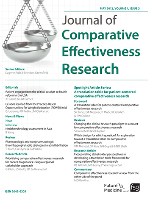
Journal of Comparative Effectiveness Research
Empowering decisions with comparative effectiveness research.Journal of Comparative Effectiveness Research is a leading academic journal dedicated to the evaluation of healthcare interventions and practices, published by Becaris Publishing. Since transitioning to a fully Open Access model in 2023, the journal has expanded its accessibility to a global audience of researchers, healthcare professionals, and policy makers. With a focus on comparative effectiveness in health policy, it has achieved a notable ranking of #132 out of 310 in the Scopus category for Medicine and Health Policy, placing it in the 57th percentile for scholarly impact. Operating from the United Kingdom, the journal encompasses research from 2012 to 2024 and firmly establishes itself in the academic landscape as a Q2 journal in the Health Policy category as of 2023. By disseminating high-quality, evidence-based research, the Journal of Comparative Effectiveness Research plays a vital role in informing clinical practice and health policy decision-making, making it an essential resource for those dedicated to improving health outcomes.
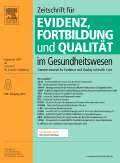
Zeitschrift fur Evidenz Fortbildung und Qualitaet im Gesundheitswesen
Shaping health outcomes with impactful evidence and education.Zeitschrift für Evidenz Fortbildung und Qualität im Gesundheitswesen, published by Elsevier GmbH, serves as a pivotal platform for the dissemination of research and innovations within the realms of health policy, medicine, and education. Established in 2008 and continuing its impactful trajectory through 2024, this journal boasts a recognition as a Q2 journal in Education and positions itself within the Q3 tier for both Health Policy and miscellaneous Medicine categories, reflecting its dual focus on scholarly rigor and practical application. Despite not being an Open Access journal, it remains a valued resource for academics and practitioners, evidenced by its rankings: #214 out of 398 in Medicine (miscellaneous) and #829 out of 1543 in Social Sciences (Education) according to Scopus metrics. The journal's commitment to enhancing education and quality in healthcare makes it an essential read for researchers, professionals, and students seeking to stay abreast of the latest evidence-based practices and policies that shape health outcomes worldwide.

Risk Management and Healthcare Policy
Transforming healthcare strategies for a safer tomorrow.Risk Management and Healthcare Policy is an esteemed Open Access journal published by DOVE MEDICAL PRESS LTD, dedicated to advancing the fields of health policy and public health. Established in 2008, the journal fosters a rich dialogue among researchers, professionals, and students, focusing on innovative strategies for managing risks within healthcare systems. With a current impact factor reflected in its robust Scopus rankings—placing it in the top quartile (Q2) in both Health Policy and Public Health, Environmental and Occupational Health—the journal is a pivotal resource that shares critical insights and evidence-based practices. The journal not only covers empirical studies and analytical research but also promotes discussions on emerging challenges and opportunities within the healthcare sector. As a result, Risk Management and Healthcare Policy serves as a vital platform for disseminating high-quality research, fostering collaboration, and informing policy decisions aimed at enhancing health outcomes globally.